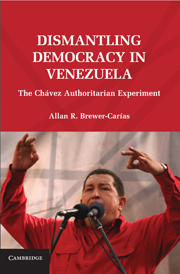Book contents
- Frontmatter
- Contents
- AUTHOR'S NOTE
- INTRODUCTION DEFRAUDING DEMOCRACY THROUGH NONCONSENSUAL CONSTITUENT ASSEMBLIES
- PART ONE THE POLITICAL ASSAULT ON STATE POWERS AND THE FRAMEWORK FOR AUTHORITARIANISM
- Chapter 1 THE 1999 EXCLUSIONIST CONSTITUTION-MAKING PROCESS
- Chapter 2 THE ENDLESS AND ILLEGITIMATE TRANSITORY CONSTITUTIONAL REGIME
- Chapter 3 THE 1999 POLITICAL CONSTITUTION AND THE REINFORCEMENT OF CENTRALIZATION
- Chapter 4 THE 1999 SOCIAL AND ECONOMIC CONSTITUTION AND ITS PROBLEMS
- PART TWO INSTITUTIONAL DEVELOPMENT TOWARD CONSOLIDATING AUTHORITARIANISM
- PART THREE CONSTITUTIONAL REFORMS DESIGNED TO CONSOLIDATE AUTHORITARIANISM
- INDEX
Chapter 2 - THE ENDLESS AND ILLEGITIMATE TRANSITORY CONSTITUTIONAL REGIME
Published online by Cambridge University Press: 05 June 2012
- Frontmatter
- Contents
- AUTHOR'S NOTE
- INTRODUCTION DEFRAUDING DEMOCRACY THROUGH NONCONSENSUAL CONSTITUENT ASSEMBLIES
- PART ONE THE POLITICAL ASSAULT ON STATE POWERS AND THE FRAMEWORK FOR AUTHORITARIANISM
- Chapter 1 THE 1999 EXCLUSIONIST CONSTITUTION-MAKING PROCESS
- Chapter 2 THE ENDLESS AND ILLEGITIMATE TRANSITORY CONSTITUTIONAL REGIME
- Chapter 3 THE 1999 POLITICAL CONSTITUTION AND THE REINFORCEMENT OF CENTRALIZATION
- Chapter 4 THE 1999 SOCIAL AND ECONOMIC CONSTITUTION AND ITS PROBLEMS
- PART TWO INSTITUTIONAL DEVELOPMENT TOWARD CONSOLIDATING AUTHORITARIANISM
- PART THREE CONSTITUTIONAL REFORMS DESIGNED TO CONSOLIDATE AUTHORITARIANISM
- INDEX
Summary
The same Constituent Assembly that sanctioned the 1999 Constitution modified it one week after its popular approval through referendum, and more than one week before it began to be enforced through its publication in the Official Gazette. The Constituent Assembly, evading any popular approval, issued a decree creating the Transitory Constitutional Regime preventing the effective enforcement of the Constitution, through which the country began to have two constitutions: one approved by the people and another without such approval.
FAILED EFFORTS TO CREATE A CONSTITUTIONAL FRAMEWORK TO TRANSITION PUBLIC POWERS THROUGH AN APPROBATORY REFERENDUM
The National Constituent Assembly, when sanctioning the new Constitution on November 15, 1999, included in its text just a few transitory provisions that were those approved by the people in the December 15, 1999, referendum. The Constitution does not contain any provision regarding the then-existing constituent powers or the situation of the head officials of branches of government elected in 1998, so the applicable principle was the continuation of the elected officials up to the election of new ones according to the provisions of the new Constitution.
Due to the fact that the draft constitution of November 15, 1999, did not contain any such provision regarding the tenure of those elected high officials, on November 19, 1999, the same day that the draft was signed for submission to approbatory referendum, the Constituent Assembly approved a decree seeking the convening of a parallel consultative referendum, which was to take place also on December 15, 1999 – that is, the same day fixed for the approbatory referendum of the new Constitution.
- Type
- Chapter
- Information
- Dismantling Democracy in VenezuelaThe Chávez Authoritarian Experiment, pp. 69 - 86Publisher: Cambridge University PressPrint publication year: 2010



